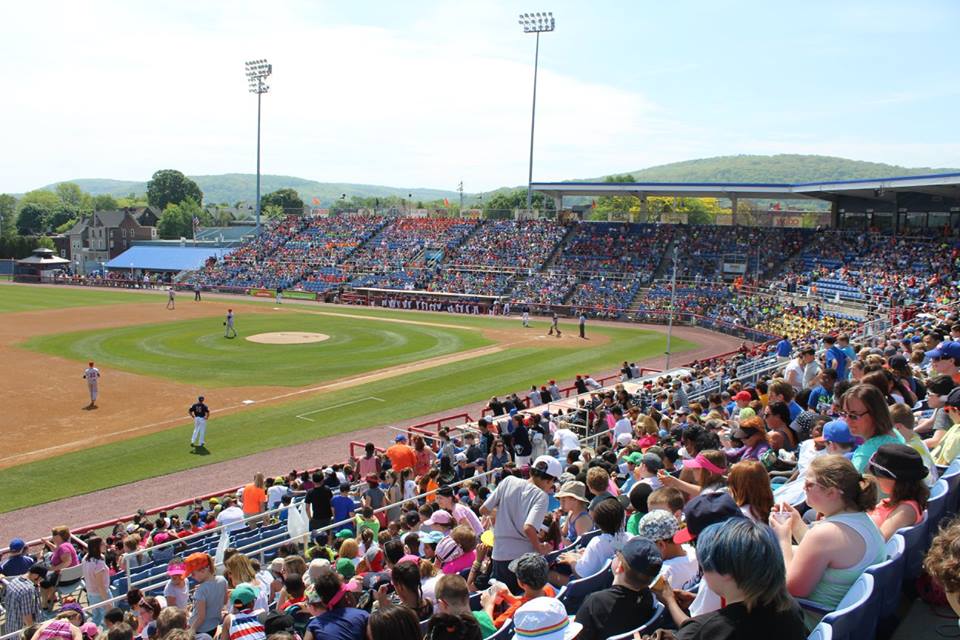For several years prior to this season, the B-Mets were discussed as a team that could relocate, with reports tying them to cities such as Ottawa and Wilmington, DE. Over the winter, the franchise’s fate took a different turn, as John Hughes purchased the team from Binghamton Mets Baseball Club in December and immediately stated his intent to keep the team in Binghamton. While it was not until March that the team contest was announced, he says that it was something he had in mind from the beginning.
“When I looked at the team, with all the rumors of it leaving, it was important to say that the team was staying,” said Hughes. “Not only is the team staying, but your team is staying.”
The rebranding process is something that Hughes characterized as “delivering the team to the community.” While the team maintains a very strong relationship with its parent club, the New York Mets—in fact, the two sides are paired through at least 2020—one of the goals of the rebranding process is to provide the team with a name that is more unique to the Binghamton community.
Upon purchasing the team, Hughes announced that longtime general manager Jim Weed would stay in his position. Weed, who took over in 2010 after serving in a variety of capacities with the B-Mets for 14 seasons, was unequivocal in backing Hughes’ decision to undertake the rebranding process. “Absolutely. The timing was right on this, and this was a great thing to do.”
Starting on Opening Day, the B-Mets accepted suggestions from fans on a new name. These entries also gave participants a chance to decide whether the team would be identified as Binghamton, Southern Tier, or Triple Cities, with Binghamton winning that portion of the contest. Before their game on May 17, the B-Mets revealed six finalists from a pool of over 1,500 entries, leaving it up to the fans to choose from the Bullheads, Gobblers, Rocking Horses, Rumble Ponies, Stud Muffins, or Timber Jockeys.
Each name has a unique characteristic that ties it to Binghamton’s history. Rocking Horses, Rumble Ponies, Stud Muffins, and Timber Jockeys are all nods to the city’s status as the “Carousel Capital of the World”—a name that derives from the fact that Binghamton is home to six rare antique carousels. Bullheads refers to the bullhead catfish that is native to the local Susquehanna River, while Gobblers is an homage to the region’s hunting culture.
“A lot of the names that we have are very unique,” said Weed. “When someone else hears those names down the road, they are going to think of Binghamton, New York, and that is very important to this community.”
“I feel strongly that the citizens of Binghamton gave us strong contenders,” added Hughes.
The voting for the finalist closed earlier this month. As of right now, the team is in the process of collecting and analyzing the data. An announcement on the new name is expected to be made in the early portion of October.
As has been seen in previous cases around the minors, name-the-team contests can result in an initial negative reaction from fans, only for the angst to quickly fade. When asked if he fears potential pushback when Binghamton’s new name is announced, Weed cited that trend. “You’re always going to get pushback when there’s a change. But when they start to think it through, they come to accept it.
While the new name is vital to the long-term plan for baseball in Binghamton, the team does not want its community outreach to stop there. “What we’re trying for in not only next year, but every year going forward, is an enhanced fan experience,” said Hughes. “We’re going to take some of the things this year that worked and build upon them, and those that didn’t work we will toss aside.”
“The fans have been amazing, and very accepting. That’s all part of the process of establishing that connection with the people of Binghamton and the entire Southern Tier.”
This approach, according to Weed, has provided fans with a stronger sense of security about the team’s status in Binghamton. “More than anything, people are relieved to know that the future of the club is not in doubt,” he said. “There’s just a different buzz around the ballpark, because people are happy that their team is staying here. I can definitely tell the difference.”
Over the long run, the team expects its bond with the Binghamton community will only become stronger. “I am a proud owner of the Binghamton franchise, and keeping and maintaining our relationship with the New York Mets is paramount,” said Hughes. “In tying this team to the community, it’s really going to make a big difference going forward.”

